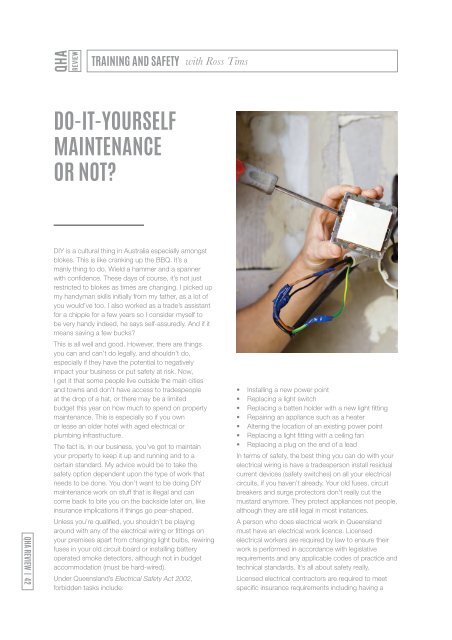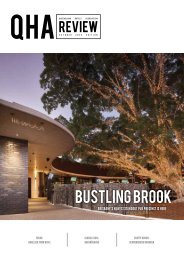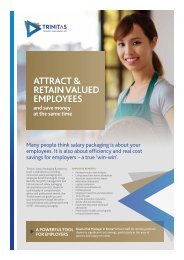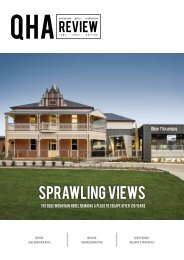QHA REVIEW April 2017
You also want an ePaper? Increase the reach of your titles
YUMPU automatically turns print PDFs into web optimized ePapers that Google loves.
TRAINING AND SAFETY<br />
with Ross Tims<br />
DO-IT-YOURSELF<br />
MAINTENANCE<br />
OR NOT?<br />
<strong>QHA</strong> <strong>REVIEW</strong> | 42<br />
DIY is a cultural thing in Australia especially amongst<br />
blokes. This is like cranking up the BBQ. It’s a<br />
manly thing to do. Wield a hammer and a spanner<br />
with confidence. These days of course, it’s not just<br />
restricted to blokes as times are changing. I picked up<br />
my handyman skills initially from my father, as a lot of<br />
you would’ve too. I also worked as a trade’s assistant<br />
for a chippie for a few years so I consider myself to<br />
be very handy indeed, he says self-assuredly. And if it<br />
means saving a few bucks?<br />
This is all well and good. However, there are things<br />
you can and can’t do legally, and shouldn’t do,<br />
especially if they have the potential to negatively<br />
impact your business or put safety at risk. Now,<br />
I get it that some people live outside the main cities<br />
and towns and don’t have access to tradespeople<br />
at the drop of a hat, or there may be a limited<br />
budget this year on how much to spend on property<br />
maintenance. This is especially so if you own<br />
or lease an older hotel with aged electrical or<br />
plumbing infrastructure.<br />
The fact is, in our business, you’ve got to maintain<br />
your property to keep it up and running and to a<br />
certain standard. My advice would be to take the<br />
safety option dependent upon the type of work that<br />
needs to be done. You don’t want to be doing DIY<br />
maintenance work on stuff that is illegal and can<br />
come back to bite you on the backside later on, like<br />
insurance implications if things go pear-shaped.<br />
Unless you’re qualified, you shouldn’t be playing<br />
around with any of the electrical wiring or fittings on<br />
your premises apart from changing light bulbs, rewiring<br />
fuses in your old circuit board or installing battery<br />
operated smoke detectors, although not in budget<br />
accommodation (must be hard-wired).<br />
Under Queensland’s Electrical Safety Act 2002,<br />
forbidden tasks include:<br />
• Installing a new power point<br />
• Replacing a light switch<br />
• Replacing a batten holder with a new light fitting<br />
• Repairing an appliance such as a heater<br />
• Altering the location of an existing power point<br />
• Replacing a light fitting with a ceiling fan<br />
• Replacing a plug on the end of a lead<br />
In terms of safety, the best thing you can do with your<br />
electrical wiring is have a tradesperson install residual<br />
current devices (safety switches) on all your electrical<br />
circuits, if you haven’t already. Your old fuses, circuit<br />
breakers and surge protectors don’t really cut the<br />
mustard anymore. They protect appliances not people,<br />
although they are still legal in most instances.<br />
A person who does electrical work in Queensland<br />
must have an electrical work licence. Licensed<br />
electrical workers are required by law to ensure their<br />
work is performed in accordance with legislative<br />
requirements and any applicable codes of practice and<br />
technical standards. It’s all about safety really.<br />
Licensed electrical contractors are required to meet<br />
specific insurance requirements including having a

















